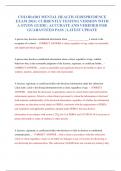COLORADO MENTA L HEALTH JURISPRUDENCE EXAM 2024 | CURRENTLY TESTING VERSION WITH A STUDY GUIDE | ACCUR ATE AND VERIFIED FOR GUARANTEED PASS | LATEST UPDATE A person may disclose confidential info rmation when _________________ a school or the occupants of a school. - CORRECT ANSWER A client, regardless of age, makes an articulable and significant threat against A person may disclose confidential information when a client, regardless of age, exhib its behaviors that, in the reasonable judgment of the licensee, registrant, or certificate holder... - CORRECT ANSWER ....create an articulable and significant threat to the health or safety of students, teachers, administrators, or other school personnel . A licensee, registrant, or certificate holder who discloses information under this subsection (2)(d).. hint: (2)(d) = disclosing information from a client, regardless of age. - CORRECT ANSWER ...shall limit the disclosure to appropriate school or sch ool district personnel and law enforcement agencies. School or school district personnel to whom the information is disclosed shall maintain confidentiality of the disclosed information, regardless of whether the information constitutes an education record subject to FERPA, consistent with the requirements of FERPA and regulations and applicable guidelines adopted under FERPA, but may disclose information in accordance with section 1232g (b)(1) of FERPA and 34 CFR 99.36 if necessary to protect the health or safety of students or other persons. A licensee, registrant, or certificate holder who discloses or fails to disclose a confidential communication... - CORRECT ANSWER ...with a client in accordance with this subsection (2)(d) (A client regardless of age ) is not liable for damages in any civil action for disclosing or not disclosing the communication. This subsection (2)(d)(III) does not rescind any statutory duty to warn and protect specified in, and does not eliminate any potential civil liability for f ailure to comply with, section 13 -21-117. Subsection (2)(d) does not apply to... hint: (2)(d) = disclosing information from a client, regardless of age. - CORRECT ANSWER ...an education record that, under FERPA, is exempt from the HIPAA privacy rule. Subsection (2)(d) applies to covered entities, as defined in HIPAA as... hint: (2)(d) = disclosing information from a client, regardless of age. - CORRECT ANSWER "Articulable and significant threat" means a threat to the health or safety of a person that, based on the totality of the circumstances, can be explained or articulated and that constitutes a threat of substantial bodily harm to a person. FERPA means... - CORRECT ANSWER the federal "Family Educational Rights and Privacy Act of 1974" HIPPA mean s... - CORRECT ANSWER the federal "Health Insurance Portability and Accountability Act of 1996" "School" means... - CORRECT ANSWER a public or private preschool; elementary, middle, junior high, or high school; or institution of postsecondary education described in title 23, including the Auraria higher education center created in article 70 of title 23. The records and information produced and used in the review provided for in subsection (2)(c) of this section... hint: (2)(c) = A review of services of a licensee, registrant, or certificate holder is conducted - CORRECT ANSWER ...do not become public records solely by virtue of the use of the records and information. The identity of a client whose records are revie wed shall not be disclosed to any person not directly involved in the review process, and procedures shall be adopted by a board, hospital, association, or society to ensure that the identity of the client is concealed during the review process itself and to comply with section 12 -245-226 (4). Subsection (1) of disclosing confidential information does not apply to... - CORRECT ANSWER ...any delinquency or criminal proceeding, except as provided in section 13 -90-107 regarding any delinquency or criminal pr oceeding involving a licensed psychologist . Disclosure of Confidential Information - CORRECT ANSWER A licensee, registrant, or certificate holder shall not disclose, without the consent of the client, any confidential communications made by the client, or advice given to the client, in the course of professional employment. A licensee's, registrant's, or certificate holder's employee or associate, whether clerical or professional, shall not disclose any knowledge of the communications acquired in that capacity. Any person who has participated in any therapy conducted under the supervision of a licensee, registrant, or certificate holder, including group therapy sessions, shall not disclose any knowledge gained during the course of the therapy without the consent of the person t o whom the knowledge relates. A person may disclose confidential information when a client or the heirs, executors, or administrators of a client... - CORRECT ANSWER ...file suit or a complaint against a licensee, registrant, or certificate holder on any cause of action arising out of or connected with the care or treatment of the client by the licensee, registrant, or certificate holder




